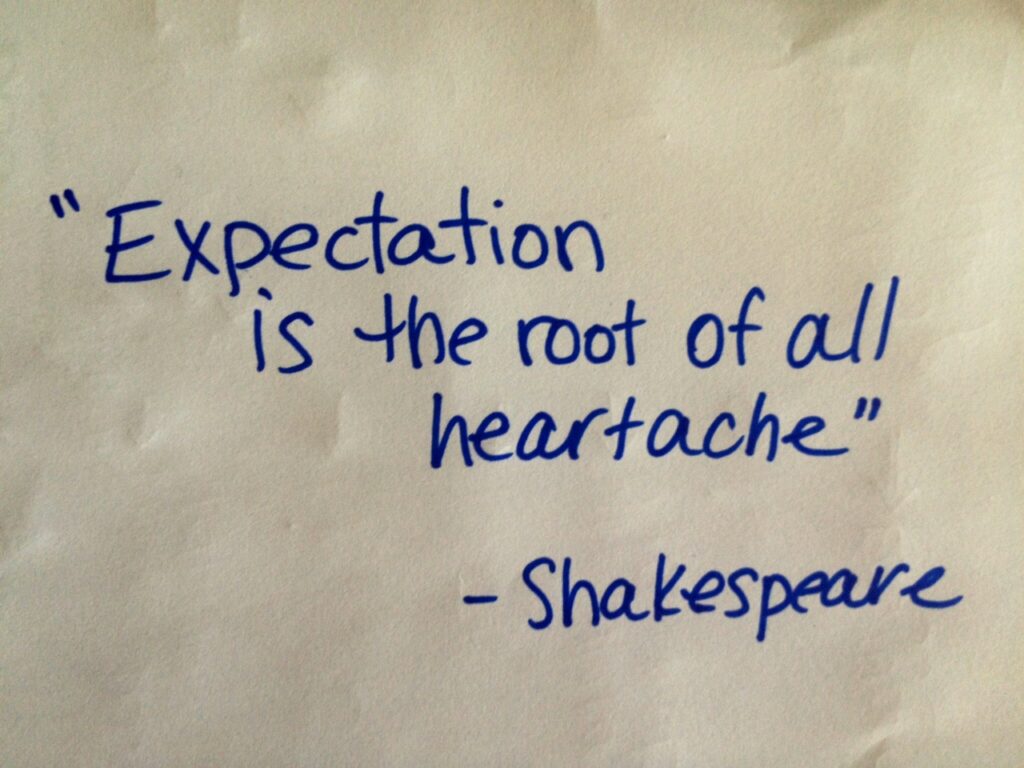What did you expect?!
ex·pec·ta·tion
/ˌekspekˈtāSH(ə)n/
noun
1. a strong belief that something will happen or be the case in the future.
2. “reality had not lived up to expectations”
We’ve all been there; someone comes to us in confidence to vent about a situation or undesirable outcome. After being a good listener, gaining an appreciation for the circumstances that led to their plight, we muster every ounce of strength to not condescendingly say “Well, what did you expect?!” Maybe that’s just me.

For most people, when we speak of tempering expectations, we defer to the idea of re-adjusting so that they are lower and, therefore, more realistic. The assumption is this is used for situations in which people had unrealistically high expectations about something, overly optimistic of the outcome. As a coach I’ve found that it’s not necessarily the expectation that needs tempering but the more the understanding of what needs to occur to make it a reality.
The important underlying aspect here is a person’s understanding of reality. Humans are emotionally driven creatures that often succumb to clouded judgement and ignore reality. Emotion allows us to mis-interpret as what we want vice what is occurring. We are surprised and confused when the outcome doesn’t fit the expectation.
We see this in every aspect of our lives. As a coach I see it most often in the health, fitness, and skill levels of our students. The amount of work and effort someone thinks is appropriate, or is currently doing, to achieve goal isn’t always commensurate with what is really needed. Failure to achieve the goal is often met with disappointment and questions. Why didn’t I get there?
Well, you didn’t put in the work. What did you expect?
Now as a coach, I work hard to avoid saying that. Instead it’s on me to help the person to put both goal and what is needed to get there into perspective. Often, the goal is quite clear in their mind but a complete lack of understanding with respect to the reality of what it’ll take. My best example is a client indicating she wants to look like the cover model on the fitness magazine. Do you really understand what she does to look like that? Do you have the discipline, drive and ability to commit to the extremely regimented lifestyle she likely does?
Competitors in my gym will be the first to tell you. When I see them not putting in the amount of work and effort I think is necessary, I’ll implore to do more and simply remind them I’m not the one going to get punched in the face in a few months. Passive aggressive? OK, you got me. The bigger point is they feel (or convinced themselves) they are doing enough and if I don’t check their understanding of what is really needed then their expectation for success may be sorely unfulfilled.

The opposite is true as well. Let’s not forget tempering can, and should, also include raising of expectations. An overly pessimistic approach to our ability or the work we’ve put in can just as easily be cause for adjusting an expectation to the positive. We view this as a lack of confidence.
Put people in your life that are willing to check you on your understanding of reality. Truth is we are never as good as we think we are, we’re never as bad either. We don’t push ourselves as hard as we could. Our rose colored glasses make it difficult to remain objective about our own effort. We make assumptions, which are nothing more than selfishly concocted expectations when we don’t want to put in the necessary effort. Temper your effort and your expectations will be realized.
Everyday Is Training Day – Reap What You Sow
